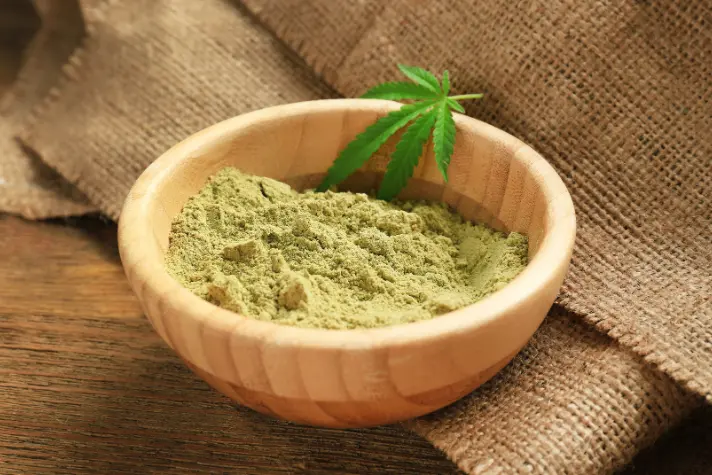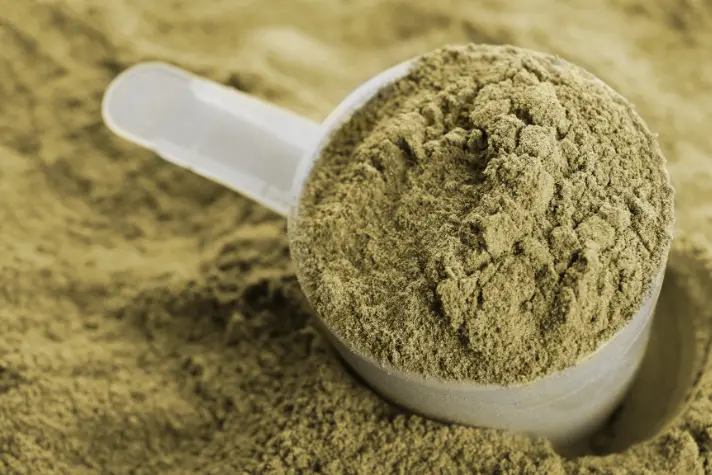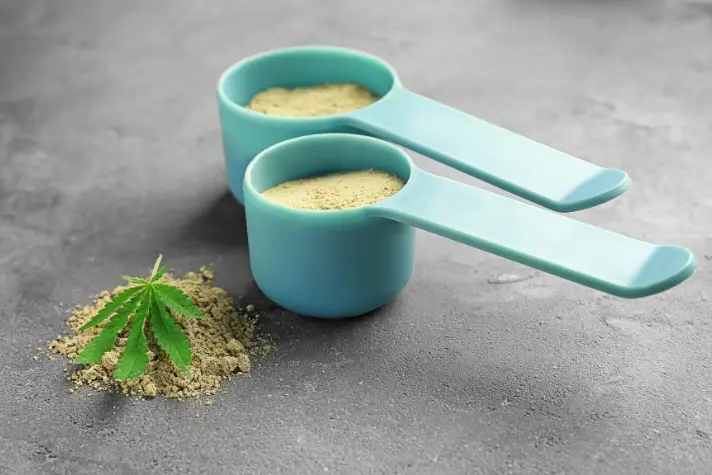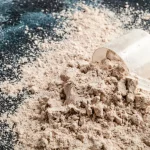
Hemp protein powder is a natural plant-based supplement that’s gaining traction among health enthusiasts. But where exactly does this nutrient-rich product originate?
The journey starts with the humble hemp seed, derived from Cannabis sativa, which is also known for yielding marijuana and CBD products. Unlike its cousins though, hemp seeds have negligible amounts of psychoactive compounds like THC, so there are no mental effects.
Hemp protein is like the Swiss Army knife of plant-based proteins, offering a versatile range of nutrients. Hemp protein powder is an abundant source of not only protein but also fiber and essential fatty acids, created from ground hemp seeds.
A Complete Protein Source
When you think complete protein, think hemp. This power-packed powder contains all nine essential amino acids that your body can’t make on its own.
What does this mean for you? Well, it’s simple: your muscles get the full spectrum of building blocks they need to repair and grow after a workout.
For those who’ve swapped steak for salads in pursuit of health or ethical eating, finding such completeness in one place is like hitting the jackpot.
Fiber-Filled For Digestive Wellness
Besides keeping muscles happy, hemp protein keeps your digestive system running smoothly thanks to its high fiber content. But here’s where it gets interesting: unlike other sources that may cause discomfort due to excessive fermentation by gut bacteria – a real party pooper – hemp’s fiber profile is gentle yet effective.
This means less bloating and better bowel regularity without any surprises. Think about swapping out roughage roulette with smooth sailing – that’s what adding hemp to your diet feels like.
Packed With Minerals And Antioxidants
Mining through the nutritional landscape, we uncover another treasure trove within hemp protein – minerals galore. Zinc for immune support; iron for blood health; and magnesium plays cupid helping hundreds of enzyme reactions find their perfect match within our bodies – it’s all there in respectable amounts.
And let’s not forget antioxidants; these are nature’s bouncers kicking free radicals out before they stir up trouble (like oxidative stress). So while munching down on some nutrient-dense hemp powder, rest assured you’re bolstering more than just muscle – you’re supporting whole-body wellness.
The Right Kind Of Fat Is In The Mix Too
Last but certainly not least comes fat – but hold off on the eye roll because we’re talking heart-healthy fats here. Omega-6s paired with omega-3s in an almost ideal ratio come together harmoniously within this green goodness.
Think avocado toast meets almond butter – all wrapped into one earthy-tasting scoopful – with bonus points awarded since no extra oil extraction process is involved.
In essence, choosing hemp means opting for wholesome fuel that feeds both body cells and soul alike because sometimes good nutrition isn’t just about the physical benefits. It’s also about how it makes you feel inside and out.
Benefits of Hemp Protein Powder
Hemp protein powder isn’t just another trend; it’s a full-fledged powerhouse when it comes to nutrition.
So, why are fitness enthusiasts and health-conscious folks turning towards this plant-based gem?
Let’s break down the perks.
A Complete Protein
You might have heard that term tossed around before – ‘complete protein.’ What does it mean? Well, hemp protein brings all nine essential amino acids to the table. Your body can’t make these on its own, so getting them from your diet is crucial. A scoop of hemp protein powder could be your ticket to meeting those needs without any animal products in sight.
For vegans or anyone leaning into more plant-based eating, hemp is like hitting the jackpot – it naturally offers what many other plants lack: completeness in amino profile. This makes building muscle and repairing tissue easier for our bodies because we’ve got all the necessary building blocks ready at hand.
Good Source of Fiber/Digestive Friendly
Digestion issues? Hemp has got you covered there too. It’s chock-full of fiber which keeps things moving along smoothly through your digestive tract – think fewer traffic jams and more green lights for gut health. But unlike some high-fiber foods that feel heavy or hard to digest, one of the greatest benefits of hemp protein powder is that it’s gentle on the system while still packing a fibrous punch.
This means regularity (we’re talking bowel movements) gets better with hemp on board – and who doesn’t want a happier belly?
Rich in Minerals and Antioxidants
Hemp goes beyond proteins and fibers – it serves up minerals such as magnesium, calcium, iron, zinc…the list goes on. And antioxidants? They’re here too. These nutrients team up against stressors like pollution or UV rays that attack our cells daily; they help fight back keeping us feeling fresh longer than if we were going solo without them.
Quality Fat Source
Last but not least let’s talk fats – not just any fats but good ones omega-6s including gamma-linolenic acid (GLA). Why should you care about GLA? Research suggests it helps with inflammation among other benefits which is great news after tough workouts or dealing with chronic conditions where swelling becomes an issue.
Getting enough healthy fats in our diet, particularly omega-6 and omega-3 fatty acids, is important. These essential nutrients are abundant in certain foods and play a vital role in maintaining good health.
Is Hemp Protein the Best Vegan Protein Source?

Vegans often seek out robust sources of protein that align with their dietary choices. Hemp protein is a contender, but is it the best?
Let’s look at its amino acid profile and compare.
Amino Acid Profile
Hemp seeds are unique in their offering of all nine essential amino acids. This makes hemp protein stand out as a complete plant-based protein, akin to what animal proteins provide. The presence of these building blocks gives it an edge over many other plant proteins that typically lack one or more essential amino acids.
The quality of this profile matters because your body can’t make these on its own; you need them from food. While not as high in lysine as some alternatives like pea or soy, hemp does offer sufficient amounts for general health needs if combined smartly with other foods.
Comparison With Other Vegan Proteins
In the ring against heavyweights like soy and peas, hemp holds up quite well due to its completeness. But we should consider digestibility too – a measure known as PDCAAS (Protein Digestibility-Corrected Amino Acid Score).
On this scale, while whey tops the list due to easy absorbability by our bodies, most plant proteins score lower – and hemp isn’t an exception here compared to soy or pea proteins which have been processed to remove fiber and thus may be digested more easily.
Soy comes ahead slightly when looking purely at muscle-building potential thanks largely to higher levels of leucine – the key branch-chain amino acid linked with muscle synthesis – but don’t count hemp out just yet. It still brings a strong game packed full of nutritional benefits beyond just muscles alone.
Nutritional Synergy Beyond Protein
Beyond pure numbers lies nutrition synergy – how different components work together for overall health benefits – which might elevate hemp further than traditional comparisons suggest. For instance, hemp’s rich omega fatty acid content works hand-in-hand with its proteins supporting anti-inflammatory processes vital for recovery after exercise – not something isolated forms like whey can claim without additional supplementation.
Moreover, hemp’s natural richness in fiber supports digestive wellness – a boon for anyone needing help maintaining gut health alongside their fitness goals. And let’s not forget minerals: magnesium, zinc, and iron come bundled within those little seeds, giving you more bang per scoop.
To sum up, hemp lands itself amongst top-tier resources due to its versatility and sustainability. This powerhouse plant offers a multitude of benefits, ranging from environmental advantages to economic opportunities. Integrating hemp into various industries can lead to significant advancements and innovation.
Potential Side Effects of Hemp Protein Powder

While hemp protein powder is celebrated for its nutritional benefits, it’s crucial to consider how your body might react. Even the best things have their caveats.
Gastrointestinal Discomforts
Hemp protein is a rich source of fiber – a double-edged sword. Fiber can promote digestion, but if you’re not accustomed to high-fiber diets, it may cause bloating and gas. It’s like suddenly shifting from a slow jog to sprinting – it takes time for your gut to catch up. If you notice discomfort after adding hemp protein into your diet, consider easing in more slowly.
If digestive issues persist or worsen, this could be an indicator that hemp proteins aren’t meshing well with your system. Listen closely – your body knows best when something isn’t quite right.
Allergic Reactions and Sensitivities
Although rare compared with other allergens, some individuals may experience allergic reactions to hemp seeds or their derivatives. This could manifest as skin rashes or more severe symptoms requiring medical attention. Because allergies are no small matter (think of them as the body’s mistaken identity crisis), always check in with healthcare professionals if you suspect an allergy.
In addition – and worth noting – is that those sensitive to THC (the psychoactive compound found in cannabis) needn’t worry too much here; though related by plant family ties, industrial hemp contains only trace amounts.
Impact on Existing Health Conditions
If managing health conditions under medical supervision – for instance, thyroid disorders – you’ll want professional guidance before making changes like introducing new supplements like regular hemp protein powder consumption.
How to use hemp protein powder
Here’s how you can get creative with this plant-based powerhouse.
Mix it into Smoothies
Add a scoop of hemp protein powder to your morning smoothie for an easy nutrient boost. Blend it with fruits like bananas or berries, leafy greens, and your choice of liquid – almond milk makes for a great pairing.
Incorporating hemp protein in smoothies helps maintain the drink’s creamy texture while packing in essential amino acids and fiber.
Bake With It
Baking? Yes. Hemp protein can be used as a flour substitute in many recipes due to its fine consistency. When making muffins, bread, or pancakes, replace about 25% of regular flour with hemp protein for added benefits without compromising on texture.
- Create vegan burgers by using hemp as part of the patty mixture – it binds ingredients together while adding nutrients.
- Elevate homemade energy bars by mixing in hemp; they’ll keep you fueled longer.
- Dust onto popcorn instead of butter for an extra punch – a movie snack that feeds your muscles.
Enhance Your Coffee Experience
Coffee aficionados might enjoy putting protein powder in coffee. Hemp and other plant protein powders work well with hot liquids compared to whey. Not only does this add a unique flavor to your coffee but it also transforms coffee into a recovery-promoting, nutrient-dense cup of joe.
If hot drinks aren’t up your alley try blending ice-cold brew coffee or tea with vanilla-flavored protein power which gives a delightful twist to traditional frappe.
Fold into Oatmeal or Yogurt
Sprinkle some hemp protein over your bowl of oatmeal or mix it into yogurt. This not only adds depth but also enhances the meal’s nutritional value without altering taste significantly. A dash of cinnamon can complement the nutty flavor profile well.
So why limit yourself? There are plenty more ways out there waiting for exploration. Be sure to experiment and find what works best for your personal taste and lifestyle needs.
About The Author:
Tyler Tafelsky is an endurance athlete and blogger at BetterTriathlete.com. In addition to writing about sports like cycling, running, and triathlon, Tyler also competes in ultra-distance cycling races at the professional level.




